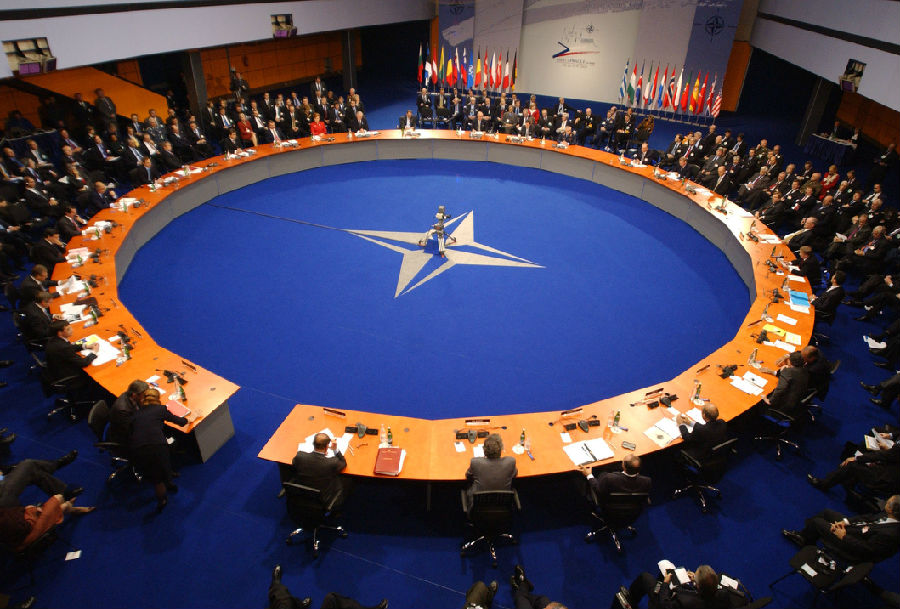Is NATO Trump’s next target?
北约是特朗普接下来的目标吗?
By Charlotte McDonald-Gibson/Brussels
文/(布鲁塞尔)夏洛特· 麦克唐纳-吉布森
THE PREFERRED TERM FOR THE 29 COUNTRIES of the North Atlantic Treaty Organization is not members or signatories but allies.
北大西洋公约组织(NATO)名下29个国家的首选成为不是成员国,也不是签署国,而是盟国。
Yet as a July 11–12 NATO summit approaches,
7月11日至12日的北约峰会日渐临近,
28 of those nations’ leaders would be forgiven for questioning whether that word still applies to the leader of the 29th.
其中28个国家的领导人都在质疑这一称谓是否仍对剩余那一个国家有效,然而,他们有此担忧也无可厚非。
In the space of two weeks in June,
今年六月,在短短两周之内,
U.S. President Donald Trump baited the E.U. and Canada into a trade war;
美国总统特朗普不仅挑起了欧盟和加拿大的贸易战,
argued that Russian President Vladimir Putin—still under E.U. and U.S. sanctions for the annexation of Crimea—should be invited back into the G-7;
声称七国集团应该邀请俄罗斯总统普京——吞并了克里米亚的普京目前仍在欧盟和美国的制裁之下——回到集团;
and branded Canadian Prime Minister Justin Trudeau as “dishonest” and “weak.”
还指责加拿大总理贾斯汀·特鲁多“不诚实”、“软弱”。
He then met with North Korean dictator Kim Jong Un, calling him a “very talented” leader.
随后,他会见了朝鲜独裁者金正恩,称他是一位“非常有才华的”领导人。
More recently, National Security Adviser John Bolton was dispatched to Moscow to meet the Russian President, ahead of a Trump-Putin summit in mid-July.
最近,国家安全顾问约翰·博尔顿被派往莫斯科,在7月中旬特朗普与普京举行峰会之前先行与普京会面。
That could strengthen bilateral ties between the U.S. and Russia—and make allies even more anxious.
此举既能巩固美国和俄罗斯的双边关系,也会使盟国陷入更深的焦虑。
“The friends and allies of the United States (were left) wondering, who is the leader of the democratic world?”
“美国的朋友和盟国都在琢磨,到底谁才是民主世界的领袖?”

Anders Fogh Rasmussen, the previous Secretary-General of NATO, tells TIME.
北约前秘书长安诺斯·福格·拉斯穆森告诉《时代》周刊。
Many in Brussels are now concerned that NATO, the alliance that has preserved global stability since 1949,
在布鲁塞尔,许多人都在担心,面对总统颠覆现有国际秩序的企图,
might be the next foundation block to go as the President tries to uproot the old world order.
1949年以来一直维持着全球稳定的北约组织或将成为下一个被撤走的基石。
“It would be no less than a disaster,” says Rasmussen. “Not only for the Western democratic world but for the democratic world globally.”
“无论是对西方民主社会,还是整个民主社会而言,”拉斯穆森说。“那都无异于是一场灾难。”
NATO HAS LONG PLAYED a key role in Trump’s narrative that the U.S. foots the bill for the rest of the world at the expense of its own citizens.
特朗普反复扬言,美国是在花自己公民的钱给其他国家买单,在他的这一讲述中,北约一直扮演了关键的角色。
He once again lambasted NATO allies’ contributions during a speech on June 25 in South Carolina
6月25日,在南卡罗莱纳州的一次演讲上,他再次抨击了北约盟国出力不够一事,
by falsely claiming that the U.S. was responsible for 90% of spending.
谎称美国承担了北约90%的支出。
In fact, the U.S. provides 22% of the NATO alliance’s common funding—
事实上,美国只承担了22%的北约联盟共同基金——
which covers NATO’s running costs, the military budget and some capabilities like aerial surveillance.
该基金负责填补北约的运营成本、军事预算以及空中监视之类的能力等各项支出。
Under pressure from Washington—and reacting to Russian aggression—
面对华盛顿的施压——以及俄罗斯的气焰——
NATO members agreed in 2014 to each increase defense spending to 2% of GDP by 2024.
2014年,北约各盟国同意,在2024年之前,将国防开支比例上调至GDP的2%。
So far, only eight NATO countries have met that target, Rasmussen says.
截至目前,仅有8个国家完成了这一任务,拉斯穆森说。
While many Europeans agree with Trump’s general point about defense spending, his approach is exasperating allies.
尽管许多欧洲人都赞成特朗普在国防开支方面的总体观点,他的做法却激怒了许多盟友。
One day after the G-7 summit, Trump launched a Twitter tirade aimed at Europe,
因为七国集团峰会闭幕的一天后,特朗普就在推特上发表了针对欧洲的长篇大论,
lamenting that the U.S. spends money “protecting many of these same countries that rip us off on Trade” and warning that “change is coming.”
悲叹美国是在花钱“保护那些在贸易上剥削我们的国家”,还警告说“改变即将到来”。



